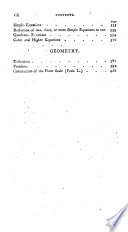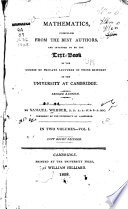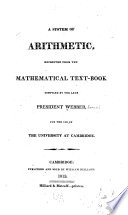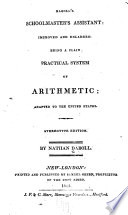 | Alexander Malcolm - 1730 - 702 pages
...fliewn that</x«— -i=s/— -л. and dividing equally by » — i, it is</= *. Ж *^~ I 2. For ti multiply the Sum of the Extremes by the Number of Terms, and take half of the Produo, it's the Sum : Thus *= *"HX*. E*a*,fk: - = 3./=iy.» = 7. then is /==6, —... | |
 | 1801 - 446 pages
...1'te frit term, the last term, and the number of terms behtg given, to find the sum of all the terms. RULE.* Multiply the sum of the extremes by the number of terms,, and half the product will be the answer. EXAMPLES. * Suppose another series of the same kind with the given... | |
 | William M. Finlay - 1803 - 272 pages
...7=44-r-4= 11 + 1 = 12, number of terms, Am. PROBLEM VI. Given the extremes and common difference, to find the sum of the series. RULE. — Multiply the sum of the extremes by their difference, increased by the common difference, and, the firoduct divided by twice the common... | |
 | Samuel Webber - 1808 - 466 pages
...Thejirst term, the last term, and the number of terms beinggiven, to jind the sum of all the terms, Multiply the sum of the extremes by the number of terms, and half the product will be the answer. EXAMPLES. 1. The first term of an arithmetical progrrssion is... | |
 | Nicolas Pike - 1808 - 470 pages
...term, the last term, and the number of terms being given, tojind the sum of all the terms. RuLE.f — Multiply the sum of the extremes by the number of terms, and half the producl will be the answer. EXAMPLES. • The difference of the firft and laft terms evidently... | |
 | Samuel Webber - 1812 - 260 pages
...Tke first term, the last term, and the number of terms being given, to find the sum of all the terms. RULE.* / Multiply the sum of the extremes by the number of terms, ami half the product will be die vinswer. EXAMPLES. 1. The first term of an Arithmetical Progression... | |
 | Nathan Daboll - 1815 - 250 pages
...Problems ; but mast of them are best understood by an algebraic process, iand »re here omiti.".' t RULE. Multiply the sum of the extremes by the number of terms, and half the product wiH be the answer. EXAMPLE8. ). The first term of an arithmetical series is 3, the... | |
 | Nathan Daboll - 1818 - 246 pages
...variety of Problems ; but most of them are best understood by an algebraic process, nnd are here omitted. RULE. Multiply the sum of the extremes by the number of terms, and half the product will be the answer.' EXAMPLES. ^ . 1. The first term of an arithmetical series is... | |
 | 1818 - 264 pages
...The first term, the last term, and the number of terms being given, to find the sum of all the terms. RULE. Multiply the sum of the extremes by the number of terms,," and half the product will be the answer. EXAMPLES. 1. The first term of an arithmetical progression is... | |
 | Nathan Daboll - 1825 - 256 pages
...them are best understood by an algebraic and are here omitted. ARVniMF.TICAL PllOGRESSFiON. I9S Ui LE. Multiply the sum of the extremes by the number of terms, and lialf the product will be the answer. EX \MPLES. 1. '["he first tenn of an arithmetical series is 5,... | |
| |